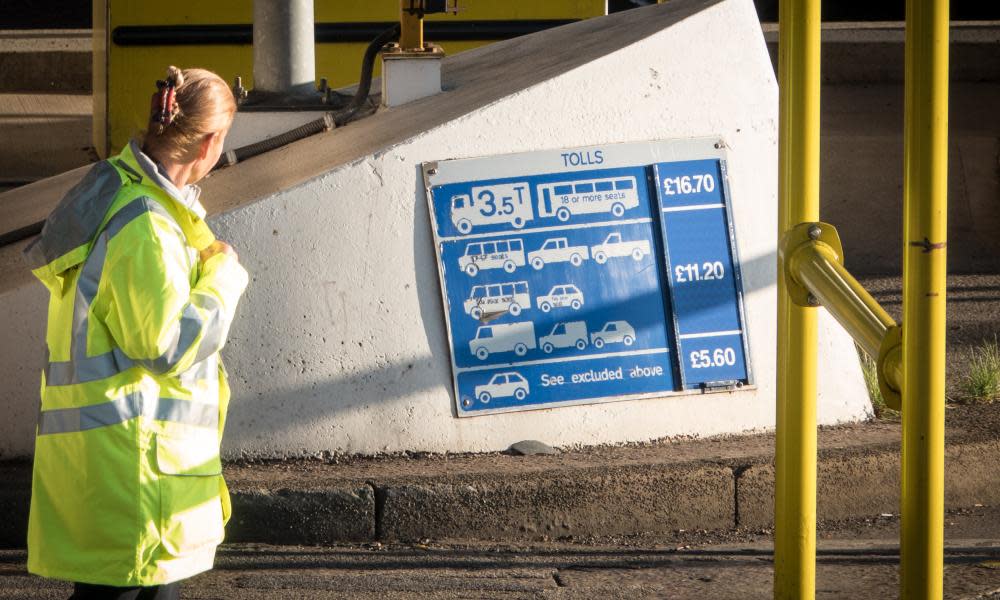‘After half a century, a drive to Wales no longer takes its toll on motorists’

In a rare gap in the sea drizzle rolling up the Severn estuary, Darren Moore gazes fondly at the row of 14 booths where for 12 years he has been collecting tolls from drivers entering Wales. “It’s sad to think that all this will be going,” he says, as lorries slow for the toll barriers on the second Severn crossing. “They should take one of these booths and put it in the Museum of Welsh Life – people will be reminiscing about it one day.”
On Monday the booths will be completely removed, with drivers crossing both Severn bridges no longer liable for the toll, which is £5.60 for cars and £16.70 for lorries.
Moore understands why regular commuters paying over £1,000 a year will be celebrating but he – along with up to 100 other toll collectors and support staff – is losing a varied job, with many happy memories. “It is the end of an era. My main concern is my friends – one doesn’t have a job to go to,” he says.
The tolls, which have been in place for 52 years, have long been seen as a tax on entering Wales, since motorists don’t pay to cross into England. A private consortium, including Barclays and John Laing, took over the original bridge in 1992 and opened the second bridge in 1996. The consortium collected more than £1bn from the public before transferring the bridges to the Highways Agency in January.
The Welsh government says the removal of the tolls, announced last year, will boost the Welsh economy by £100m a year; Welsh secretary Alun Cairns has said it will create “a growth corridor” from Cardiff, through Newport to Bristol.
One family-owned haulier will certainly be toasting the toll’s demise with a glass of fizz. Terry Hicks, who built up Hicks Logistics from a single vehicle in the 1970s to 80 trucks now, spends £100,000 a year on the tolls. “Over the past 10 years we’ve spent £1m,” he says in his office on a sodden industrial park between the bridges. “We haven’t got a level playing field. Firms in Avonmouth don’t have to pay to get back to Wales.” He is planning to put the savings into the business: “We can invest more in drivers and equipment now.”
House prices have been rising rapidly in the three Welsh local authorities closest to the Severn bridges. Newport has seen an increase of 13.7% since the 2017 announcement that the tolls were going. Estate agent Chris Davis, a partner at Davis & Sons, says Bristol commuters have been tempted by lower prices in the city: “It’s a sales market that I’ve never seen in 17 years in Newport – we had 10 buyers to every property.”
In Newport’s covered market, traders and shoppers are glad the toll is finally coming to an end. Karen Sheppard, working in the market cafe, says it was unfair that the toll increased each year: “They said originally it was to pay for the bridge but how many times over have we paid for it?”
Others in the market sound a note of caution about rising rents. Kelly Hill, who works for a homelessness charity, says: “I’m pleased – but I work with the homeless. The landlords can be fussier now. They used to take people on benefits. Now they have got working people coming over from Bristol.”
Transport professor Stuart Cole, adviser to the Welsh select committee for 16 years, says the public had to “pay through the nose” because the bridges were built and operated by private companies, rather than the public sector. “The private consortium got a very good deal. It was a bad deal for the public,” he says. “The tolls would have been taken off around 15 years ago if it had been financed though the Public Works Loan Board rather than a PFI [private finance initiative].”
According to a Welsh affairs select committee report, the second bridge cost £330m to build, with running costs for both bridges amounting to £15m annually. Yet the private consortium Severn River Crossing plc was collecting £72m a year.
Back at the Severn tolls, Moore says drivers are starting to show the collectors more respect now the end is near. “I got a box of chocolates the other day,” he says. “Somebody has written us a poem about how they see us as a welcome to Wales.”

 Yahoo News
Yahoo News 
